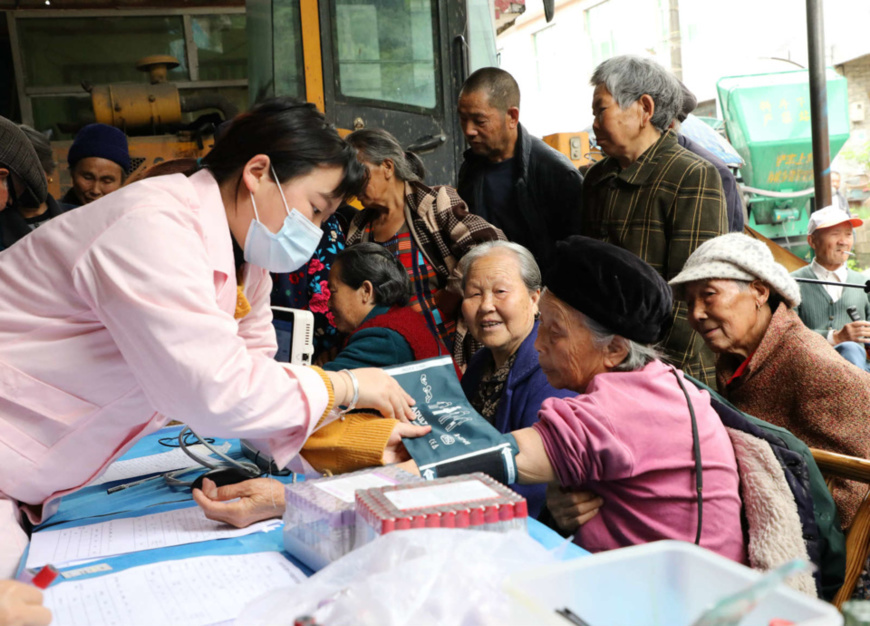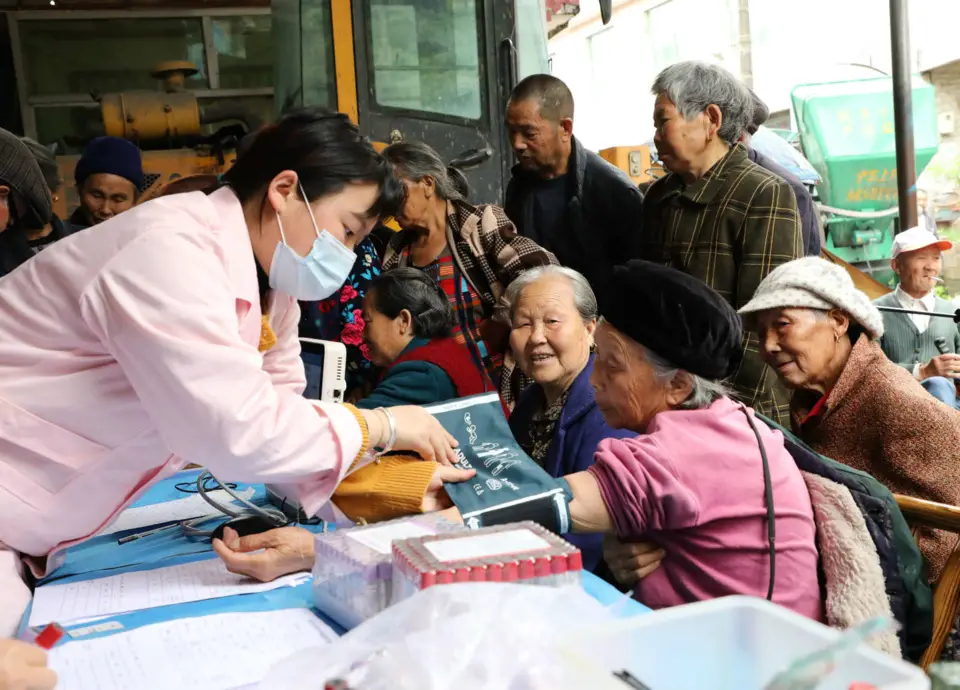By Li Fuqiang and Luo Wei, People’s Daily Overseas Edition

Medical workers check health conditions for empty-nesters for free in Huanglian village, Qingshuiping town, Baojing county, Central China’s Hunan Province on May 14. (Photo by Yu Caihua/People’s Daily Online)
China aims to win the fight against poverty this year, and the remaining tasks of the anti-poverty fight are arduous. Rural areas, where a large proportion of people fell into poverty because of illnesses and disabilities, are one of the hardest nuts to crack in the country’s poverty relief drive.
The task will only become more difficult, as it not only requires eradicating the existing poverty, but is also about preventing reoccurrence of poverty induced by diseases.
In recent years, local governments in China have put their utmost effort to implement health-related poverty-alleviation programs.
Deng Guanghong, a doctor from Chengdu First People’s Hospital in capital of Southwest China’s Sichuan Province, is one of the medical workers taking part in a health-related poverty alleviation program in a Tibetan-inhabited area in the province.
In June 2018, Deng volunteered when an opportunity to help poverty eradication in Dege County of Tibetan Autonomous Prefecture of Garze in the province arose in his hospital. And by the end of the month, he set off for Ranka village, Keluodong township, to serve as a poverty-alleviation official for two years.
Lying at an average altitude of 4,200 meters above sea level, the county has a harsh plateau climate, and therefore suffers backward economic conditions, with animal husbandry as the mainstay. Many people there suffer lifelong endemic diseases.
Located in a pasturing area, the village has 28 poverty-stricken households among a total of 133.
Deng and another three officials share a dormitory less than 20 square meters, and can only go to the town to take a shower once a week. In winter, even the water in the dormitory freezes.
However, the severe conditions did not bother him, “It didn’t take long before I adapted to the new life here,” said Deng optimistically.
Deng began to investigate the poor households upon arrival. He sorted the personal, housing and sheepfold information, and obtained the satellite positioning information of each household, which offered accurate information for the implementation of the programs. Soon he got a full grasp of the conditions of the households, especially poverty-stricken ones.
Deng imparted various kinds of knowledge in the evening schools for the villagers, and focused on the prevention of diseases, such as echinococcosis, tuberculosis and Kaschin-Beck disease. It was not only because these subjects are his forte, but more importantly, illness is one of the major reasons for poverty.
Over the two years, Deng has held more than 50 lectures, among which 30 lectures concern prevention and treatment of diseases. Thanks to his efforts, the concept of health has taken roots in the hearts of local people.
The poor families in the village are always on Deng’s mind, and Thutop’s family has drawn more attention from him.
Little Thutop struggled with active epileptic seizures, and every year his mother would take him to big cities to seek treatment. The huge medical expenses overwhelmed the poor family.
After learning the condition, Deng contacted Chengdu First People’s Hospital, and consulted the director of department of neurology about the treatment many times. He also paid special attention to the little boy’s daily life and diet.
One night in July 2019, seizure happened again. Thutop fell flat on his face, with his head and eyes severely injured. Thutop’s mother called Deng for help, and the latter rushed to his home, checked his conditions and sent the boy to a hospital in the county.
Later Deng sent the boy to the hospital he works for, for a permanent cure for epileptic seizures. “Thank you, Uncle Deng, I don’t know how I can repay you,” the boy told him.
In addition, with the help of Deng, two severely disabled villagers applied for disability evaluation, got disabled certificate, and were therefore entitled to social assistance, welfare and insurance benefits of the country.
One of the villagers, A Ge, was included in the system of minimum living allowances by local department of civil affairs last November, and could enjoy reduction and fee cuts of examination, treatment and hospitalization.
Once pessimistic about life, A Ge has regained confidence and enthusiasm for his life, and cannot stop thanking Deng every time he meets Deng.
Deng’s task is about to end in this June, but according to the arrangements of the hospital he works for and his own will, he is going to stay in the village for another year, as consolidating the fruits of poverty alleviation is still a difficult task. And the doctor is determined to carry on with health-related poverty alleviation programs.
The task will only become more difficult, as it not only requires eradicating the existing poverty, but is also about preventing reoccurrence of poverty induced by diseases.
In recent years, local governments in China have put their utmost effort to implement health-related poverty-alleviation programs.
Deng Guanghong, a doctor from Chengdu First People’s Hospital in capital of Southwest China’s Sichuan Province, is one of the medical workers taking part in a health-related poverty alleviation program in a Tibetan-inhabited area in the province.
In June 2018, Deng volunteered when an opportunity to help poverty eradication in Dege County of Tibetan Autonomous Prefecture of Garze in the province arose in his hospital. And by the end of the month, he set off for Ranka village, Keluodong township, to serve as a poverty-alleviation official for two years.
Lying at an average altitude of 4,200 meters above sea level, the county has a harsh plateau climate, and therefore suffers backward economic conditions, with animal husbandry as the mainstay. Many people there suffer lifelong endemic diseases.
Located in a pasturing area, the village has 28 poverty-stricken households among a total of 133.
Deng and another three officials share a dormitory less than 20 square meters, and can only go to the town to take a shower once a week. In winter, even the water in the dormitory freezes.
However, the severe conditions did not bother him, “It didn’t take long before I adapted to the new life here,” said Deng optimistically.
Deng began to investigate the poor households upon arrival. He sorted the personal, housing and sheepfold information, and obtained the satellite positioning information of each household, which offered accurate information for the implementation of the programs. Soon he got a full grasp of the conditions of the households, especially poverty-stricken ones.
Deng imparted various kinds of knowledge in the evening schools for the villagers, and focused on the prevention of diseases, such as echinococcosis, tuberculosis and Kaschin-Beck disease. It was not only because these subjects are his forte, but more importantly, illness is one of the major reasons for poverty.
Over the two years, Deng has held more than 50 lectures, among which 30 lectures concern prevention and treatment of diseases. Thanks to his efforts, the concept of health has taken roots in the hearts of local people.
The poor families in the village are always on Deng’s mind, and Thutop’s family has drawn more attention from him.
Little Thutop struggled with active epileptic seizures, and every year his mother would take him to big cities to seek treatment. The huge medical expenses overwhelmed the poor family.
After learning the condition, Deng contacted Chengdu First People’s Hospital, and consulted the director of department of neurology about the treatment many times. He also paid special attention to the little boy’s daily life and diet.
One night in July 2019, seizure happened again. Thutop fell flat on his face, with his head and eyes severely injured. Thutop’s mother called Deng for help, and the latter rushed to his home, checked his conditions and sent the boy to a hospital in the county.
Later Deng sent the boy to the hospital he works for, for a permanent cure for epileptic seizures. “Thank you, Uncle Deng, I don’t know how I can repay you,” the boy told him.
In addition, with the help of Deng, two severely disabled villagers applied for disability evaluation, got disabled certificate, and were therefore entitled to social assistance, welfare and insurance benefits of the country.
One of the villagers, A Ge, was included in the system of minimum living allowances by local department of civil affairs last November, and could enjoy reduction and fee cuts of examination, treatment and hospitalization.
Once pessimistic about life, A Ge has regained confidence and enthusiasm for his life, and cannot stop thanking Deng every time he meets Deng.
Deng’s task is about to end in this June, but according to the arrangements of the hospital he works for and his own will, he is going to stay in the village for another year, as consolidating the fruits of poverty alleviation is still a difficult task. And the doctor is determined to carry on with health-related poverty alleviation programs.
 Menu
Menu
 China’s doctor makes unremitting efforts to fulfill health-related poverty alleviation tasks
China’s doctor makes unremitting efforts to fulfill health-related poverty alleviation tasks
















